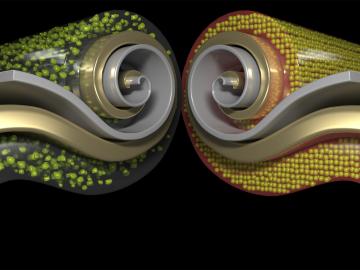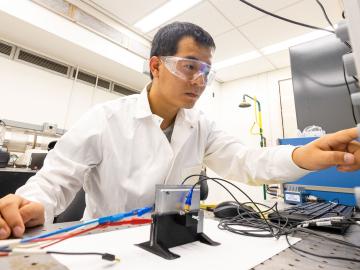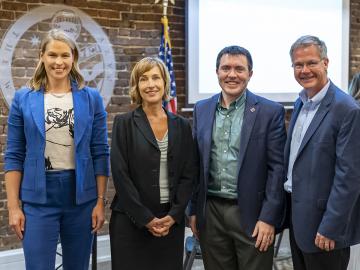
Filter News
Area of Research
- (-) Energy Science (105)
- (-) Supercomputing (64)
- Advanced Manufacturing (2)
- Biology and Environment (57)
- Biology and Soft Matter (1)
- Computational Engineering (1)
- Computer Science (5)
- Electricity and Smart Grid (1)
- Energy Frontier Research Centers (1)
- Energy Sciences (1)
- Fuel Cycle Science and Technology (1)
- Functional Materials for Energy (2)
- Fusion and Fission (45)
- Fusion Energy (18)
- Isotope Development and Production (1)
- Isotopes (5)
- Materials (121)
- Materials for Computing (12)
- Mathematics (1)
- National Security (13)
- Neutron Science (34)
- Nuclear Science and Technology (39)
- Nuclear Systems Modeling, Simulation and Validation (2)
- Quantum information Science (9)
News Topics
- (-) Advanced Reactors (7)
- (-) Energy Storage (74)
- (-) Fusion (2)
- (-) Mercury (3)
- (-) Nanotechnology (15)
- (-) Nuclear Energy (11)
- (-) Physics (8)
- (-) Quantum Science (26)
- 3-D Printing/Advanced Manufacturing (81)
- Artificial Intelligence (42)
- Big Data (27)
- Bioenergy (29)
- Biology (19)
- Biomedical (22)
- Biotechnology (6)
- Buildings (39)
- Chemical Sciences (16)
- Clean Water (8)
- Composites (17)
- Computer Science (108)
- Coronavirus (25)
- Critical Materials (12)
- Cybersecurity (14)
- Environment (69)
- Exascale Computing (27)
- Fossil Energy (2)
- Frontier (32)
- Grid (41)
- High-Performance Computing (44)
- Hydropower (3)
- Isotopes (2)
- Machine Learning (20)
- Materials (45)
- Materials Science (40)
- Mathematics (4)
- Microelectronics (1)
- Microscopy (14)
- Molten Salt (1)
- National Security (11)
- Neutron Science (20)
- Partnerships (12)
- Polymers (13)
- Quantum Computing (20)
- Security (10)
- Simulation (18)
- Software (1)
- Space Exploration (6)
- Statistics (1)
- Summit (44)
- Transportation (70)
Media Contacts

Researchers at ORNL have developed a new method for producing a key component of lithium-ion batteries. The result is a more affordable battery from a faster, less wasteful process that uses less toxic material.

As the United States shifts away from fossil-fuel-burning cars and trucks, scientists at the Department of Energy’s Oak Ridge and Argonne national laboratories are exploring options for another form of transportation: trains. The research focuses on zero-carbon hydrogen and other low-carbon fuels as viable alternatives to diesel for the rail industry.

Scientists at Oak Ridge National Laboratory are using ultrasounds — usually associated with medical imaging — to check the health of an operating battery. The technique uses sensors as small as a thumbnail, which could be attached to a lithium-ion battery inside a car.

ORNL researchers are deploying their broad expertise in climate data and modeling to create science-based mitigation strategies for cities stressed by climate change as part of two U.S. Department of Energy Urban Integrated Field Laboratory projects.

A crowd of investors and supporters turned out for last week’s Innovation Crossroads Showcase at the Knoxville Chamber as part of Innov865 Week. Sponsored by ORNL and the Tennessee Advanced Energy Business Council, the event celebrated deep-tech entrepreneurs and the Oak Ridge Corridor as a growing energy innovation hub for the nation.

Researchers at ORNL and the University of Tennessee, Knoxville, discovered a key material needed for fast-charging lithium-ion batteries. The commercially relevant approach opens a potential pathway to improve charging speeds for electric vehicles.

Two years after ORNL provided a model of nearly every building in America, commercial partners are using the tool for tasks ranging from designing energy-efficient buildings and cities to linking energy efficiency to real estate value and risk.

When Hurricane Maria battered Puerto Rico in 2017, winds snapped trees and destroyed homes, while heavy rains transformed streets into rivers. But after the storm passed, the human toll continued to grow as residents struggled without electricity for months. Five years later, power outages remain long and frequent.

ORNL has been selected to lead an Energy Frontier Research Center, or EFRC, focused on polymer electrolytes for next-generation energy storage devices such as fuel cells and solid-state electric vehicle batteries.

Five National Quantum Information Science Research Centers are leveraging the behavior of nature at the smallest scales to develop technologies for science’s most complex problems.


